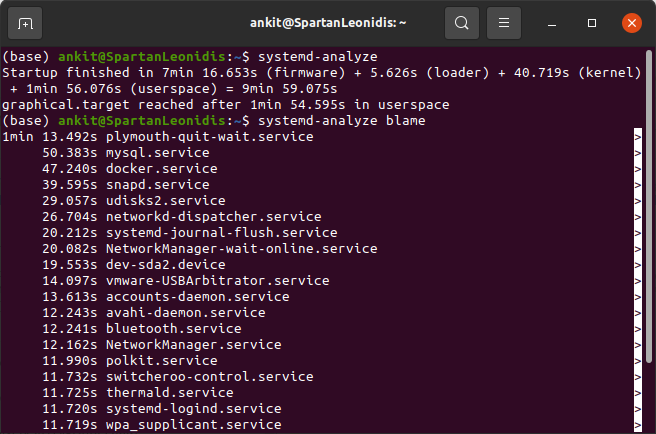Hello there, since the past 1 week my boot time has become ridiculously high.
Can someone please suggest if this is a hardware issue or software-related? I couldn’t find anything regarding this on the internet.
Edit 1
Kernel: 5.4.0-72-generic x86_64 bits: 64 compiler: gcc v: 9.3.0X.Org 1.20.9 driver: modesetting,nvidia
I did an update and upgrade on my system. Installed bleachbit and VMware (for windows related work) in the past week.
Hi! I’m posting this because the boot time on my fresh Manjaro install seems to be quite slow. For the context, I bought a new laptop last week and after the initialization and a few minutes on Windows, I installed Manjaro. The boot time with...
Reading time: 3 mins 🕑
Likes: 3 ❤
Hi! I am writing because the boot time of my machine is somewhat unbearable. It used to be quite fast: something must have gone wrong somewhere. I am trying to understand what might be wrong, with little success. I have run the command ...
Reading time: 11 mins 🕑
Likes: 5 ❤
https://forums.linuxmint.com/viewtopic.php?t=272168
https://forums.linuxmint.com/viewtopic.php?t=237615
https://forums.linuxmint.com/viewtopic.php?t=89670
boot, dual-boot, 19.10
boot, grub2, login, ssd
boot, apt, ssd, snap
Please check out all the links first.
After you have done that, please add the following command’s output to your post:
inxi -Fxz
Do you remember, what changed a week ago? Did you upgrade anything? Install new software? Change settings/configuration?
1 Like
I generally find with Laptops, that they boot quicker plugged in, so I take out the battery and rely on power only. If of course you’re able to find a power outlet? Every OS I have ever tried on a laptop booting from battery slows down boot time tremendously. I sometimes take my Laptop to work with me, as I work nights and am able to use power outlet.
I see you have a Nvidia card, that can slow down boot time too, as it’s booting it’s finding the default display, especially if you have the new Nvidia Driver for Laptops, that let you choose which display driver you want to use. Whether it’s Intel or AMD or Nvidia display. Also is there any not needed programs starting up at boot, that the boot loader has to read and load up? So many factors come into play when booting a Laptop from battery. They are even slower in Windows to boot.
The problem is most likely BIOS setup. I had the same problem with my machine. Went through the BIOS line by line and made sure that it was set up for the hardware in the system properly. Now it boots up in less than 15 seconds and shuts down in less than 10 seconds. Windows machines don’t even finish POST in that time! Good luck.
Update
systemd-analyze
Startup finished in 4.840s (firmware) + 5.714s (loader) + 4.764s (kernel) + 1min 41.076s (userspace) = 1min 56.396s
graphical.target reached after 1min 39.893s in userspace
systemd-analyze blame
1min 10.380s plymouth-quit-wait.service
54.137s mysql.service
45.060s docker.service
38.583s udisks2.service
28.261s networkd-dispatcher.service
20.606s NetworkManager-wait-online.service
19.959s ModemManager.service
13.475s dev-sda2.device
12.600s snapd.service
11.741s vmware-USBArbitrator.service
11.521s vmware.service
10.738s nmbd.service
10.044s accounts-daemon.service
8.836s polkit.service
8.632s NetworkManager.service
8.505s avahi-daemon.service
8.503s bluetooth.service
8.014s switcheroo-control.service
8.009s thermald.service
8.003s wpa_supplicant.service
7.982s systemd-logind.service
7.096s smbd.service
7.085s dev-loop22.device
I don’t why but certain services have time > 20 sec. Is there any specific reason for this?
Ankit_Kumar_Mishra:
54.137s mysql.service
Type:
If that doesn’t work, refer to the following:
boot, mysql
boot, mysql
Akito
13 May 2021 11:05
7
My recommendation for what you should remove from your system:
Ankit_Kumar_Mishra:
54.137s mysql.service # If you are sure no app depends on it.
38.583s udisks2.service # Fancy crap, nobody actually *needs*.
12.600s snapd.service # Snap is, in my opinion, absolutely useless crap.
11.741s vmware-USBArbitrator.service # If you are not using it 100% of the time right after boot up, remove or disable this.
11.521s vmware.service # If you are not using it 100% of the time right after boot up, remove or disable this.
8.503s bluetooth.service # If you do not use a wireless mouse or keyboard, then turn this on, when you need it and not on boot up.
7.096s smbd.service # Do you even use Samba at all?
1 Like
Sometimes, a slow boot issue can be caused by a hardware conflict. I f you have recently added new hardware, I would check that.
kgwoo
27 May 2021 19:12
9
Can happen after cloning…Here is a solution if none of the others work:https://askubuntu.com/questions/737319/ubuntu-is-booting-very-slowly-after-dual-boot-with-kali/737340#737340
wow! glad to hear this with suitable changes : askubuntu.com/a/737340/497359 Severus Tux Mar 4 '16 at 13:52

 , The boot time, It is because of changed UUIDs , i.e, The new UUIDs and Old ones of your important partitions (home,Swap) has chamged. To correct this, please follow the instructions given here with suitable changes :
, The boot time, It is because of changed UUIDs , i.e, The new UUIDs and Old ones of your important partitions (home,Swap) has chamged. To correct this, please follow the instructions given here with suitable changes :